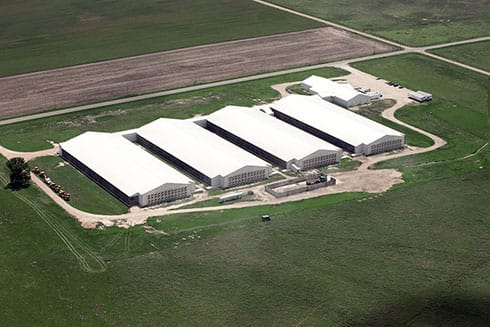This action alert is over.
Broilers, Layer Standards Could Lock-in Favorable Treatment for Factory Farms
Comments due by July 13 [Extended from June 13]
One of the reasons consumers are willing to pay premium prices for organic milk, meat, and eggs is because they think animals are cared for in a more humane manner. Rules have to be balanced between promoting important animal welfare ideals and protecting ethical farmers’ ability to produce superior food.
 |
100,000-hens per building, none outdoors. Click here for a larger version. |
The draft animal welfare standards that the USDA just released are a hodgepodge of regulations. Some are well-taken, others are so restrictive that it will make it impossible for dairy farmers, as an example, to manage their cattle in a humane and sanitary manner. Still other changes favor the corporate sector in industrial livestock production — officially legalizing factory farm egg and poultry practices.
Please send your comments to the USDA today, telling them you support The Cornucopia Institute’s comprehensive comments to protect the interest of family-scale farmers and consumers who want authentic organic food.
Major concerns that Cornucopia scientists and researchers share with other allies:
- New dimensions for dairy stalls will permit cows to lie sideways, allowing them to defecate and urinate on top of their bedding. This will create an impossible mess, jeopardizing animal health and the quality and sanitation of the milk they produce.
- Forcing livestock to be on “soil” during the winter when grazing, instead of well-designed barnyards, is not always feasible. This will create muddy, filthy, and unsanitary conditions, covered with manure and urine, and will jeopardize surface water with manure runoff.
- Top animal welfare standards require 108 square feet per bird outdoors; in Europe, organic poultry require 43 square feet. The USDA’s proposal requires less than two square feet — and half of that can be on gravel/concrete — there is no requirement for vegetation! How can chickens enjoy their lives, and exhibit their natural instinctive behaviors, on top of gravel or pavement encrusted with bird droppings?
- Indoors, chickens can be crammed into buildings, some currently holding 200,000 birds, floor to ceiling, with less than one square foot per bird Birds in this environment cannot, as required by law, perform basic natural behaviors.
- Allowing some harmful and unnecessary physical alterations, including needle teeth clipping and tail docking in pigs. These alterations are often not needed when the animals are in truly high-welfare systems and are not stressed.
- The timing on implementation is too long, giving five years for giant factory farms to comply with the minimum standards — combined with the rulemaking process, that could be six to eight years from now!
Post your comments online today — deadline July 13!
INSTRUCTIONS:
On the internet:
1. Go to the comment form at regulations.gov: https://www.regulations.gov/#!submitComment;D=AMS-NOP-15-0012-0001
2. Either write directly in the window provided on the regulations.gov form, or cut and paste the final version of your comments into the provided space.
3. You can submit comments online until 11:59 p.m. (Eastern Time) on July 13, 2016 at the above link.
4. Again, you can download a copy of this letter, customize, and paste into the form on the USDA site at: https://www.regulations.gov/#!submitComment;D=AMS-NOP-15-0012-0001
Whether you mail a letter or use the internet, please let them know if you are an organic livestock producer or are professionally involved in the organic industry in some other regard! Your voice should carry weight with government officials! Comments from organic consumers are vitally important as well, especially if you tell regulators why you care.
Additional web resources:
- Cornucopia’s comprehensive comments to the USDA including issues relating to hogs, sheep, beef and dairy cattle, and other species: https://www.cornucopia.org/usdas-proposed-animal-welfare-rule/
- An analysis of how the current draft rule differs from the National Organic Standards Board’s recommendation: https://www.cornucopia.org/usdas-proposed-animal-welfare-rule/ (addressing all species)
- The entire text of the USDA draft rule, along with their comments/explanations: https://www.regulations.gov/#!documentDetail;D=AMS_FRDOC_0001-1423 (addressing all species)
By mail:
1. If you prefer, you can mail a letter to the USDA.
2. You can cut and paste from our standard letter, although your comments will carry more weight if you include some additional thoughts of your own. Tell the USDA why these issues matter to you or anything else on your mind. Download a copy of the “standard” letter, that you can customize, at: https://www.cornucopia.org/usdas-proposed-animal-welfare-rule/
3. Creating your own individual letter, either typed or handwritten, will be even more powerful. Please feel free to use whatever you’d like from our material and add your own additional comments.
All submissions received must include the docket number: AMS-NOP-15-0012
MAIL TO: Paul Lewis Ph.D., Director, Standards Division, National Organic Program, USDA-AMS-NOP, Room 2646-So., Ag Stop 0268, 1400 Independence Ave. SW., Washington, DC 20250-0268
If you have questions or need assistance, please contact Cornucopia’s livestock policy analyst, Kestrel Burcham, at: [email protected].
Mail or email your comments today — due in Washington by July 13!

